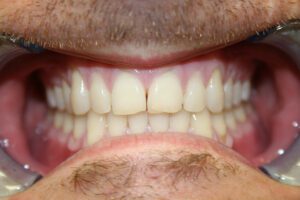 A teething baby, while sometimes cranky, is a new milestone for a young family. It symbolizes that their little baby is growing up and will soon be a toddler, eating table food, walking and more. Monrovia pediatric dentist Dr. Q finds that when it comes to baby teeth, many parents are unsure of how to take care of them. Read on for a list of 5 baby tooth care tips so that you can teach your little one proper oral hygiene.
A teething baby, while sometimes cranky, is a new milestone for a young family. It symbolizes that their little baby is growing up and will soon be a toddler, eating table food, walking and more. Monrovia pediatric dentist Dr. Q finds that when it comes to baby teeth, many parents are unsure of how to take care of them. Read on for a list of 5 baby tooth care tips so that you can teach your little one proper oral hygiene.
1. Start Taking Care of Baby’s Gums and Teeth Early.
Even before a baby has any teeth, you should be using a warm, wet washcloth or piece of gauze to wipe down his or her gums after eating. And as soon as teeth do come in, pediatric dentists say it’s time to brush twice daily and floss once every day. Monrovia pediatric dentist Dr. Q recommends you start your little one out on a training toothpaste – one without fluoride – until your child is old enough to spit the toothpaste out and not swallow it because swallowing fluoride toothpaste can be harmful for you little one. Once he or she is ready, switch to a fluoride toothpaste to prevent tooth decay. And always brush your toddler’s teeth after he or she has had sweets, like candy or cookies.
2. Avoid Cavities.
Believe it or not, even baby teeth can get cavities. And while nobody likes getting cavities filled, the process can be especially difficult for small children. Prevention is the best way to avoid baby teeth cavities. Never put your baby to bed with a bottle of milk or juice – both of which are known for causing cavities. And don’t let your infant have a bottle for a long period, especially if you notice he or she is no longer drinking from it but is using it for comfort or is playing with it. But don’t worry. Even if your baby or toddler gets a cavity, Monrovia pediatric dentist Dr. Q, a mother herself, is very experienced in working with young children. She even offers nitrous oxide (laughing gas) to pediatric patients to keep them relaxed throughout cavity fillings.
3. Once Age Appropriate, Drink Water
Milk and juice, while common baby and toddler drinks, contain sugar that can lead to cavities. But water can gently clean baby’s teeth from most baby food, and provide hydration without sugar. If your city’s water has fluoride in it, it’s especially beneficial for babies who are old enough to drink water to drink tap water, for the added benefit of a low dose of fluoride.
4. Regulate Your Baby’s Fluoride Intake
We’ve already established that you shouldn’t give a baby fluoride toothpaste if he or she is going to swallow it and that babies who are old enough to drink water should drink tap water with a low dose of fluoride, if available in your city. But, what’s so important about fluoride? Well, fluoride protects against tooth decay, and can even reverse early tooth decay. Additionally, fluoride consumed when a child has baby teeth will affect the healthiness of permanent teeth. Fluoride supplements are also available from your pediatric dentist if your child does not use fluoride toothpaste or drink tap water.
5. Schedule Your Baby’s First Pediatric Dentist Appointment at Age 1.
Monrovia pediatric dentist Dr. Q recommends that all toddlers have their first dentist appointment at age 1. While he or she may still be teething, having an early dentist appointment is a great way to introduce your child to good oral hygiene habits. It’s also an effective way to detect any early problems before they turn into bigger problems. After your toddler’s first pediatric dentist appointment, he or she should see a pediatric dentist every 6 months.
If you’re ready to schedule a pediatric dentist appointment for your child, call Dr. Q in her Monrovia office at (626) 599-9818 today.

